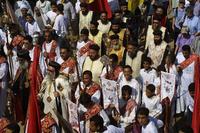-
"Somethings" may be clogging counterterrorism efforts

Initiatives by DHS to encourage sports fans, shoppers, and public transportation users to “Say Something” if they notice suspicious activity may be overwhelming the system and hindering our defenses, according to a policy analyst; the recent partnership between DHS and the NBA shows DHS does not plan on holding back its call for vigilance
-
-
Most-wanted terrorist lists missing most wanted
Anwar Awlaki, the Yemen-based American Imam inciting Muslims to attack America, has been described by U.S. security officials as “terrorist number one” and as “the most significant risk to the U.S. homeland”; he is the first U.S. citizen ever placed on the CIA targeted killing list; yet, Awlaki remains inconspicuously omitted from federal most-wanted lists — and in January 2010, customs agents had Awlaki in custody at JFK International Airport in New York on an arrest warrant for passport fraud; according to classified immigration records, JFK agents were advised to release the detainee because the warrant had mysteriously “been pulled back” the day before; inquiring minds want to know what gives
-
-
Chechen warlord claims responsibility for Moscow airport bombing
Doku Umarov, the notorious head of the Chechen extremist group Caucasus Emirate, claimed responsibility for the 24 January suicide bombing at Moscow’s airport that left thirty-six people dead and 180 injured; Umarov promised further attacks and spoke of his organization’s ability to carry out operations “whenever and wherever [they] want”; Umarov’s group is also responsible for the March 2010 bombing in the Moscow Metro and derailing a train in November 2009; Caucasus Emirate seeks to establish a Muslim nation in the Caucasus region and expel Russia
-
-
U.S. and Turkey meet to expand counter-terrorism partnership
Last week DHS secretary Janet Napolitano met with Turkey’s state minister Hayat Yazici to strengthen ties between the two countries and increase coordination to combat terrorism; Turkey is a critical ally in the Middle East and has worked closely with the United States in Iraq and Afghanistan; last month, Turkey arrested a wanted Saudi terrorism suspect who was on the Saudi Interior Ministry’s list of eight five most wanted terrorists; the meeting comes as Napolitano is working with her European counterparts to secure the global supply chain, prevent terrorists from exploiting it, and protect its critical infrastructure; Turkey has worked closely with the United States on Project Global Shield, an international effort to interdict shipments of dangerous chemicals used in improvised explosive devices (IEDs)
-
-
Study shows more non-Muslim terrorists in U.S.
A new report found that the number of American Muslims involved in terrorist acts dropped by more than half compared to 2009; in 2010 twenty American Muslims were arrested for terrorism, down from 2009’s peak of forty-seven; in 2010 there were more than twenty plots by non-Muslims compared to the ten Muslim Americans arrested for domestic plots; the report supports the argument that fears of domestic radicalization are exaggerated, and was released after the American woman calling herself “Jihad Jane” pled guilty to recruiting terrorists to kill a Swedish cartoonist; Representative Peter King is preparing for domestic radicalization hearings in the House’s Homeland Security committee
-
-
Lawmakers urge DHS to use profiling to detect terrorists
Republican lawmakers criticized DHS secretary Janet Napolitano for not focusing more on Islamic extremism and that “political correctness” was hindering her department’s ability to keep the United States safe; at a House Intelligence Committee hearing, Representative Paul Broun (R-Georgia) attacked Napolitano for not acknowledging Islamic extremism as the source of the current terrorist threat and urged DHS to use racial profiling in screening passengers at airports; Napolitano defended DHS efforts by saying threats emanated from more than just the Muslim community; a recent report found that last year twice as many plots to attack the United States were planned by non-Muslims than Muslims; the director of the National Counterterrorism Center said that focusing solely on one group could alienate them and exacerbate the problem
-
-
Yemeni cleric al Awlaki is greatest threat to U.S.
Michael E. Leiter, the director of the National Counterterrorism Center, told the House Homeland Security Committee that the mastermind behind al Qaeda in the Arabian Peninsula (AQAP) was the greatest threat to the United States; Anwar al Awlaki, the head of AQAP, is a dual U.S.—Yemeni citizen and has been linked to several attacks on the United States including the failed Christmas Day 2009 attack, the Fort Hood shootings, and the failed car bomb in Times Square, New York; counter-terrorism officials are particularly worried about al Awlaki because he is one of a few English-speaking radical clerics who can connect to young Muslims in America
-
-
275,000 visas issued to people from terror-prone countries
Nearly 275,000 entry visas to the United States have been given through 2009 to individuals from countries like Yemen, Pakistan, Somalia, Iran, and Syria — defined by the State Department as states which sponsor terrorism or in which terrorists enjoy relative free movement; it is estimated that of the 12 to 15 million undocumented aliens in the United states, between 4 and 5 million are visa overstays; DHS has only 272 agents to look for these 4 or 5 millions who disappeared after entering the United States
-
-
Bus bombing signals tough road ahead for Philippines
Al Qaeda-linked Muslim extremist group Abu Sayyaf is continuing its attacks in the Philippines; the latest attack, in Makati City, has killed five; last year, the same terrorist organization claimed responsibility for killing 116 people in a burning ferry in Manila Bay, the deadliest terrorist attack in the country’s history; lawmakers propose installing CCTVs on city buses
-
-
Lt. Col. Cabangbang flushes out Abu Sayyaf leader
Government forces killed an Abu Sayyaf leader in an encounter at a remote village in Basilan Island, southern Philippines on Tuesday; Abu Sayyaf, an Islamist separatist group founded in the 1990s with links to external terrorist organizations, has about 400 members at present
-
-
Egypt's Christians fear change will not be for the better

Egypt has the largest Christian community in the Mideast; Egypt’s Christians, who make up about 10 percent of the population, increasingly live in fear of discrimination and persecution, and political change — which many outside and inside Egypt welcome — may not be a change for the better; whatever the changes bring, Egypt’s Christians are not likely to end up with someone in power as tolerant of them as even President Hosni Mubarak has been; “The Muslim Brotherhood has a long-term commitment to establishing an Islamic state under Shariah rule in Egypt,” says one expert; “The Copts and other Christians should be worried. They would be reduced to ‘dhimmi’ status — denied the right to celebrate Christmas and weddings or otherwise publicly display their faith”
-
-
Russian extremists remotely detonate suicide bombs
Investigators believe that the suicide bomb in Russia’s airport was remotely triggered by a cell phone; officials found melted circuit boards that suggest a cell phone was embedded with the bomb; CCTV footage corroborates this theory; Russian extremists from the northern Caucasus often include remote triggers in their suicide bombs to allow handlers remotely to detonate the explosive device in the event that the attacker changes their mind or becomes incapacitated; in a recent failed attack, a spam text message prematurely triggered a female suicide bomber’s explosive device on New Year’s eve foiling a plot to kill hundreds in central Moscow
-
-
Russia fears increasing domestic radicalization
In an increasing trend, the suspected mastermind behind the recent Russian airport bombing is an ethnic Russian who converted to radical Islam; terrorists are increasingly recruiting more ethnic Russian Muslim converts to their cause; several recent prominent figures in Islamic terrorist groups have been ethnic Russian converts; the latest suspect, Vitaly Razdobudko, is believed to also be behind a failed attack planned for New Year’s Eve; authorities have been searching for Razdobudko since he went missing last October
-
-
Russia's counter terrorism woes
A recent editorial in the Washington Post illustrates Russia’s difficulties in successfully deterring terrorist attacks; the Post blasts Russian leaders citing corruption as a significant reason for their inability to successfully develop counter-terrorism policing abilities, intelligence agencies, and to secure public areas; the editorial also blames Putin’s hard line stance on the northern Caucasus region as fueling extremist movements; in 2010 terrorist attacks in the Caucasus doubled; as a stark warning, the Post reminds readers that the 2014 Winter Olympic Games is scheduled to be held on the border of the Caucuses
-
-
Middle East upheavals complicate U.S. counterterrorism efforts

If the democratic surge in Egypt causes Islamist organizations such as the Muslim Brotherhood to join the government, the toughest counterterrorism challenge ahead may come as U.S. officials are forced to work with this new government, seeking common ground against terrorist enemies even if the Islamic faction tries to distance Egypt from its neighbor, Israel; American political leaders have long fused counterterror aims with support for Israel, but even those Arabs — let alone more religious Islamist organizations such as the Brotherhood — who oppose al Qaeda and jihadism, insist on the distinction between terrorism, on the one hand, and what they consider as a legitimate resistance to continued Israeli occupation of Palestinian lands; contending with an altered Arab world landscape with rising Islamic factions could thus force hard choices on the United States
-
More headlines
The long view
What Does Netflix’s Drama “Adolescence” Tell Us About Incels and the Manosphere?
While Netflix’s psychological crime drama ‘Adolescence’ is a work of fiction, its themes offer insight into the very real and troubling rise of the incel and manosphere culture online.
